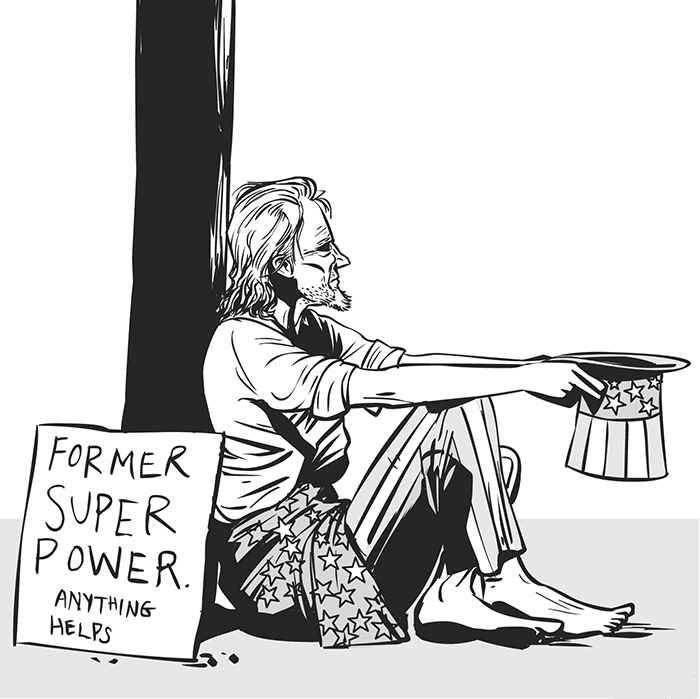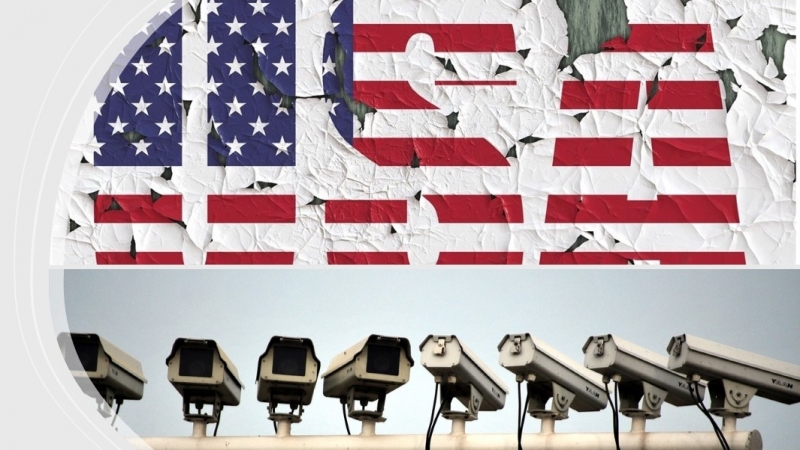Despite Its Failure, Why the US’ Enduring Appeal?
US: not a better system, just a bigger stick
Empowering Weak & OppressedTahir Mustafa
Rabi' al-Awwal 04, 1441 2019-11-01
News & Analysis
by Tahir Mustafa (News & Analysis, Crescent International Vol. 48, No. 9, Rabi' al-Awwal, 1441)
Proponents of the US socio-economic and political model assert that socialism is not really a functioning system, communism has failed, and Islamic governance is unrealistic. Thus the only viable and working model is American capitalism. With Da‘ish terrorists being presented as supposed “true and committed” Muslims, the USSR being non-existent and socialist Venezuela in crisis, it is easy to buy into the mainstream media’s narrative advocating Americanization of the world.
Probing the argument against other systems a little deeper reveals that they fare much better than the US model in many significant ways. The US model is like a McDonald’s burger; it looks appetizing, appeals to people’s taste buds, and may even taste good to some but it is junk food that is certainly not good for health. This simple analogy can be applied to many other areas of the American model, from sports to military.
The US corporate media frequently project Michael Jordan, Barack Obama, and Oprah Winfrey as symbols of American fairness. How else could African Americans rise to such prominent positions? The same media, however, would seldom mention that African Americans in the US are imprisoned at more than 5 times the rate of whites. MTV and other base instinct channels show the mansions of African-American artists, but will rarely mention that based on 2017 data “in 1968, 25 million Americans — roughly 13% of the population — lived below the poverty level. In 2016, 43.1 million — or more than 12.7% — do.”
The US military is often projected as the most lethal force in the world. Its $720 billion plus annual budget is more than the combined military budgets of the next nine countries. With such massive spending and the most advanced weaponry in the world, the US military should be the best fighting machine in the world. But is it?
Let us look at its record. True, the US military has bombed many countries of the world blowing up civilians to pieces, but has it won any war? The US killed over a million people in Vietnam; it even used Agent Orange, a banned chemical substance, destroying Vietnam’s forests and poisoning its waters. It also bombed neighboring Cambodia killing millions more but despite such mass slaughter, it did not win the war.
The US army has been in Afghanistan for 18 years. Today, however, the most modern military machine in the world, equipped with the most sophisticated fighter planes and drones is forced to negotiate its retreat from Afghanistan with the lightly armed Taliban. The disparities between the two could not be greater. Afghanistan and Vietnam are the most obvious examples. There are also other less obvious ones that we can cite: Yemen, Somalia, Lebanon, Nicaragua, Venezuela, Columbia, and Cuba. In all these locales Washington inflicted massive damage but did not achieve its political or military objectives.
Like the “might” of its military, the US economic model is also hyped-up out of proportion. A popular joke goes something like this. Bill Gates walks into a bar and everyone present there becomes a millionaire if we average out the wealth. This accurately sums-up the economic system the US presents to the world as the only viable working model. Hard data presents a different picture.
In May 2019, a study by the National Opinion Research Council (NORC) at the University of Chicago, an independent social research institution, found “that 51% of working adults in the United States would need to access savings to cover necessities if they missed more than one paycheck.” Another survey from home repair service HomeServe USA said 31% of Americans don’t have even $500 set aside to cover an unexpected expense. In 2018, Bloomberg reported that “statistics don’t quite capture the extent of US poverty.” In 2019, research by VOX showed that “no matter what — poverty is still way too high.”
In the field of economics hard data is not the only manifestation of America’s poor performance. The entire economic philosophy peddled by the US is now doubted in mainstream economic circles. In 2016, The Atlantic magazine published an article questioning one of the foundations of the capitalist economic dogma, pointing out how the economic growth model is unsustainable and can often lead to lack of productivity.

Just as its military and economic system, the US justice system is riddled with inconsistencies and failures. In January 2019, VICE described the US justice system in the following terms, “mass incarceration. Private, for-profit prisons. Laws that unfairly target minorities. Defendants being sentenced to decades for nonviolent and first-time offenses. Overcrowding. Corruption.”
With all the hard evidence pointing to the fact that the US governing model is in disarray and should in no way serve as a model to be copied by others, the question arises, what makes that system so appealing and why is it still functioning?
Firstly, no system can be implemented in a perfect manner. However, that cannot be an excuse for a state that habitually bombs other countries, backing the most brutal autocrats whose regimes preside over massive domestic problems. Secondly, one of the reasons the US looks better in comparison to other systems is because it deliberately damages other governing models that function outside its hedonistic and secular paradigm. From Venezuela to Iran, Washington regularly sabotages governments on a domestic level by backing the most regressive and inhumane forces.
In order to undermine Iran, the US is backing a cult that has for decades been involved in terrorist acts, the notorious Mujahideen-e Khalq Organisation (MKO), an outfit referred to by Iranians as Munafiqin. How is the MKO a viable alternative to a functioning governing system in Iran? Of all anti-Islamic groups, MKO is the one least likely to ever come to power in Iran, something the US intelligence agencies know well. The only reason MKO is supported by the US is to destabilize Iran.
In Latin America, the US involvement is plagued with supporting death squads, drug cartels, and brutal military dictatorships, not to mention the serial overthrow of elected leaders. Thus, how can other governing models rise and function when they are regularly sabotaged on the political, security, and economic levels? The US is unable to recover from alleged partial Russian interference in the 2016 presidential elections. How can other much smaller countries recover so quickly from constant US meddling, to offer a holistic alternative to the crumbling capitalist system of America?
If one wants to realize that an alternative is possible to the US system, it is enough to look at the medical system of Cuba, the educational system of Finland, the social assistance program of Austria and the electoral system of Islamic Iran. All these countries offer concrete practical policy examples in the named areas that perform much better than the United States of America.


